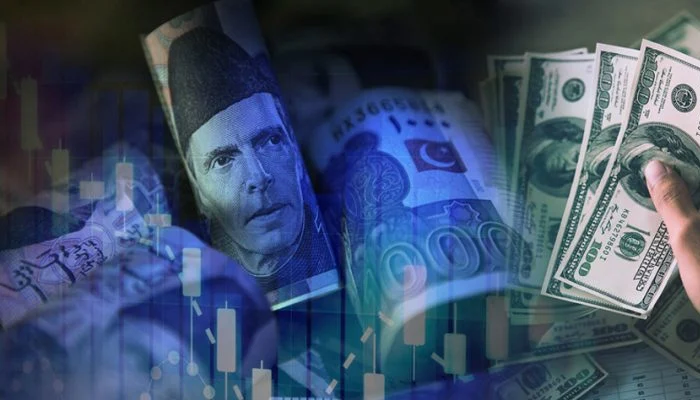- Rupee has lost over 8.27% in last twelve sessions.
- Local unit closes at 237.91 in interbank market.
- Analysts believe rupee is unlikely to reverse downward trend.
KARACHI: The Pakistani rupee reeled to a record low against the US dollar on Monday, breaching the critical threshold of 245 against the greenback in the open market.
With a fresh decline of Rs4.40, the local currency closed at Rs245.40 against the greenback in the open market.
Meanwhile, according to data released by the State Bank of Pakistan (SBP), the rupee closed at 237.91 after losing Rs1.07 (or 0.45%) as it inches closer to an all-time low of 239.94 hit on July 28.
The fall can be attributed to several factors, including the ongoing surge in dollar demand from local importers, amid the drying dollar reserves of the country and rising import bills in the wake of the worst floods, among others.
Speaking to Geo.tv, Pakistan-Kuwait Investment Company Head of Research Samiullah Tariq cited two major reasons behind the downfall of the rupee which include: import pressure and a severe liquidity crunch.
“The pressure of Peshawar foreign market — led by Afghan trade — is weighing on the local currency as the demand for greenback is more while supply is less,” he said.
In line with the massive decline of nearly Rs8 or 3.7% registered last week, other analysts also expect the local unit to hit a fresh all-time low against the US dollar this week.
Financial pundits believe that the rupee, which lost over 8.27% of its in the last twelve consecutive trading sessions, is unlikely to reverse the downward trend and may depreciate more value.
In a major economic development, the Saudi Fund for Development (SFD) on Sunday confirmed the rollover of $3 billion deposits maturing on December 5, 2022, for one year, said the State Bank of Pakistan (SBP) on Sunday.
However, analysts believe that the announcement is unlikely to alleviate pressure on the rupee, especially since there will be no material impact on the country’s foreign exchange reserves.
Commenting on this, Tariq said: “The market did not see the direct impact of the SFD development because it was just the government’s attempt to maintain foreign exchange reserves.”
The rupee has lost 13.90% of its value during the ongoing financial year of 2022-23. However, it shrank 28.81% in the calendar year 2022 as the demand for the US dollar remained high in the market.
Tariq believes that the rupee-dollar parity will improve within a month as a decline in international oil prices and prudent government policies will give the local unit a direction to move upwards.
Markets to normalise within 15 to 20 days: Miftah
A day earlier, Finance Minister Miftah Ismail said that the global markets were “jittery” about Pakistan, given the economy had suffered at least $18 billion in losses after the floods, which could go as high as $30 billion.
“Yes, our credit default risk has gone up, and our bond prices have fallen. But, I think within 15 to 20 days, the market will normalise, and I think will understand that Pakistan is committed to being prudent,” he had said.
Pakistan’s next big payment — $1 billion in international bonds — is due in December, and Miftah said that payment would “absolutely” be met.
Central bank reserves stand at $8.6 billion, despite the influx of $1.12 billion in IMF funding in late August, which are only enough for about a month of imports. The end-year target was to increase the buffer up to 2.2 months.
Miftah said Pakistan will still be able to increase reserves by up to $4 billion, even if the floods hurt the current account balance by $4 billion in more imports, such as cotton, and a negative impact on exports.
However, he estimated the current account deficit will not increase by more than $2 billion following the floods.

 Latest News3 days ago
Latest News3 days ago
 Latest News3 days ago
Latest News3 days ago
 Entertainment3 days ago
Entertainment3 days ago
 Latest News3 days ago
Latest News3 days ago
 Latest News3 days ago
Latest News3 days ago
 Latest News3 days ago
Latest News3 days ago
 Latest News3 days ago
Latest News3 days ago
 Latest News3 days ago
Latest News3 days ago

























